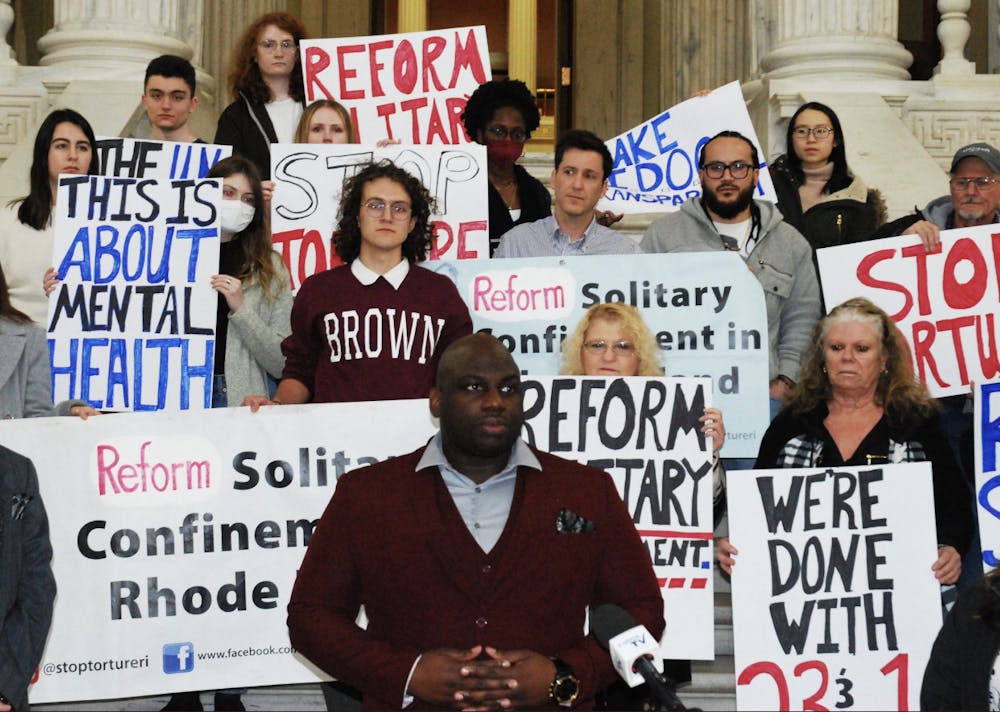On April 4, the Rhode Island House Judiciary Committee held a hearing on the Solitary Confinement Reform Act. Brown students, volunteering with the Stop Torture R.I. Coalition, testified at the hearing, reading letters written by incarcerated individuals.
The coalition is one of the leading organizations advocating for the bill, which places limits and restrictions on the use of solitary confinement in carceral settings, The Herald previously reported.
Brown students involved in various advocacy efforts have volunteered in support of the proposed legislation, which would mandate that prisoners spend the "shortest time" possible in "restrictive housing" and receive at least four hours out of their cell every day, in addition to creating a five-member “restrictive housing oversight committee.”
The United Nations Standard Minimum Rules for the Treatment of Prisoners outlines that any prolonged solitary confinement — over 15 consecutive days — should be prohibited, classifying it as “inhuman or degrading” treatment.
But incarcerated individuals in Rhode Island face solitary confinement conditions past the threshold of what is internationally recognized as torture, said Brandon Robinson, community organizer for the Coalition. Solitary confinement in Rhode Island ranges from a day to a year in some instances, and goes on indefinitely in others, according to the Rhode Island Department of Corrections’s Policy and Procedure document.
For Samuel Theoharis ’24, founder of Stop Torture R.I.'s Brown chapter, coursework, such as SOC 1116: “Criminal Courts and the Law in an Era of Mass Incarceration,” influenced their interest in the issue.
Many of the student volunteers who read letters at the State House were Theoharis’s classmates in the class, taught by Associate Professor of Sociology Nicole Gonzalez Van Cleve. The voices of incarcerated individuals “should be heard; those voices should be a catalyst for action,” he said.
Angelina Rios-Galindo ’25 became involved in criminal justice reform after “seeing the ways in which my own communities are impacted,” she said. “My dad is a tattoo artist; he learned how to tattoo when he was incarcerated,” Rios-Galindo said. Rios-Galindo currently works with the Prison Journalism Project. The project provides a platform for incarcerated writers to train as journalists.
While reading the letters at the State House from incarcerated individuals, Rios-Galindo recalled thinking, “‘How would I feel if my dad was subjected to that?’”
“They’re being really vulnerable and really open and hoping for change,” she added.
Inspired by Van Cleve’s class, Emma Toussenel MA ’23 said she began “to take action on things I wanted to change” — and volunteered to read the letters.
Reading the letters, Toussenel said, gives “a voice to the folks that can’t be present.”
“I just voice those words,” she said, “but they’re not mine and I don’t take credit for them.”
Toussenel currently works as a research director at the Mass Incarceration Lab at the Center for the Study of Race and Ethnicity in America, a project led by Van Cleve that collects oral histories and letters from individuals impacted by the criminal justice system, some of which were read during the April 4 hearing. The lab has collected around 100 oral histories and letters, according to Van Cleve.
“Their stories are indicators of the violence of the system itself, the violence of mass incarceration,” Van Cleve said.
Van Cleve said the hearing is proof that letters “are a really precious artifact,” she said. The Incarceration Lab project will aim to continue to aid activism around criminal justice reform and will continue to “build relationships” with Rhode Island non-profits, according to Van Cleve.
Brown students’ privilege creates “an obligation to the larger Providence and Rhode Island community,” said Justin Meszler ’26. “We can’t ignore the problems in our backyard.”
Meszler said he found listening to people’s experiences during Stop Torture R.I.’s meetings to be “incredibly powerful and humbling.”
Meszler read a letter written by someone around his age as part of the testimony.
“Imagining me and my friends made the experience incredibly real and more powerful for me,” he said.
Emily Ma ’21 MPH’23 became involved with Stop Torture R.I. after connecting with members from OpenDoors R.I., a non-profit that offers “reentry planning services” for incarcerated individuals, according to their website.
Meetings for Stop Torture R.I. are held at Direct Action for Rights and Equality, a Providence organization that aims to mobilize low-income families living in communities of color, according to their website.
While the time constraints of college students can sometimes be a challenge for involvement with community organizations, Anusha Alles, a community organizer for DARE, said she believes they “can provide a lot of work … and capacity.”
“Brown students do a lot of the footwork, a lot of the research, a lot of canvassing,” Robinson said. “Combining (their) book knowledge with our lived experiences (and) action, we become a powerful force.”





